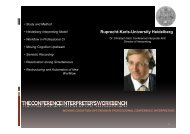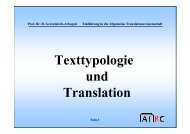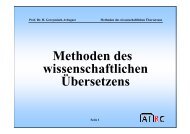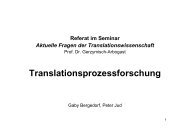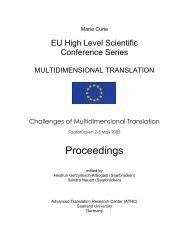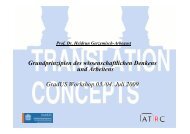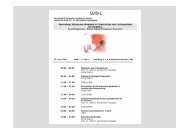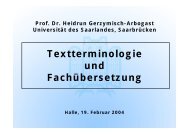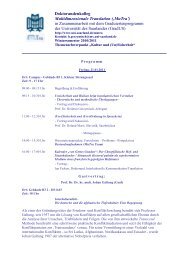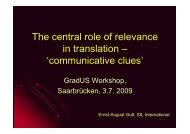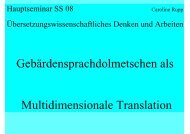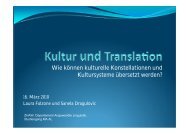Proceedings - Translation Concepts
Proceedings - Translation Concepts
Proceedings - Translation Concepts
You also want an ePaper? Increase the reach of your titles
YUMPU automatically turns print PDFs into web optimized ePapers that Google loves.
MuTra 2006 – Audiovisual <strong>Translation</strong> Scenarios: Conference <strong>Proceedings</strong><br />
Pilar Orero<br />
Abusalem (2006: 26) links the level of accuracy in translation to native speaker<br />
quality: “the translated script …may affect the level of accuracy and validity of the content<br />
being translated.” Darwish (2006: 58) accentuates the fact that translation-journalists and<br />
news presenters work as translators delivering bad quality translations. He provides numerous<br />
examples for the phenomenon which “is a serious problem that is increasingly causing<br />
misrepresentations, misunderstandings and communication breakdown across nations and<br />
cultures in globalized news media.”<br />
7 The visible translator<br />
Proceeding from the Punset example above we can also look at the issue of transparency<br />
(Allouba 1992), or, in Venuti’s (1995) terminology, the ‘invisible translator’. While<br />
translators across countries and modalities are usually invisible – which proves what a good<br />
job they do – there are interesting examples for the complete opposite as in the following case<br />
of Bin Laden and his voice-over, where the translator is not only acknowledged but signalled,<br />
when the following item appeared on the screen 2 :<br />
“The BBC's security correspondent Gordon Corera assesses what motivated the latest audio<br />
tape attributed to Osama Bin Laden, and looks for other clues in the message”. 3<br />
In second 17, the following insert appeared: “VOICE OF TRANSLATOR”. The news<br />
presenter was BBC’s Security Correspondent Gordon Corera, but a foreign voice delivered<br />
the translation as voice-over, which could be heard in the background. It was believed to be<br />
Bin Laden’s voice, at least that was the feeling given with the few seconds of delay. Whether<br />
it was Bin Laden or not is impossible to assess by the original soundtrack, which is quite<br />
muffled. The translation delivered in the two languages, as described by Luyken et al. (1991:<br />
80) “contributes to the sense of authenticity in the translation and prevents a degree of<br />
mistrust from developing”.<br />
Fig. 1:<br />
BBC Newsnight and BBC News 24 Hours, 23 April 2006, 20: 12 GMT 21: 12 UK<br />
It is suggested as a topic for further research to investigate why voice-over offers to<br />
the audience this “reality or authenticity” feeling even though we know – as is documented in<br />
the work of Eliana Franco (2001a: 290) - that “the type of delivery we hear in voice-over<br />
translation is an important strategic way of reassuring viewers that what they are being told in<br />
their own language is what is being said in the original language, although it is known that<br />
what they will be listening to is in fact only a representation of the original discourse”.<br />
2 BBC Newsnight and BBC News 24 Hours, 23 April 2006, 20: 12 GMT 21: 12 UK<br />
3 http: //news.bbc.co.uk/2/hi/middle_east/4937232.stm<br />
177



